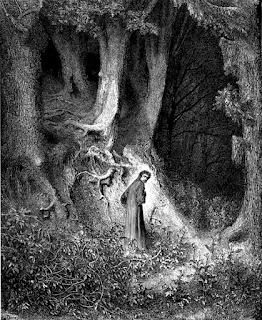On Dante's Exposition
When I had journeyed half of our life's way,
I found myself within a shadowed forest,
for I had lost the path that does not stray.
- Inferno, Canto I, Dante Alighieri
In three lines Dante immerses the reader in his grave danger and reveals the magnitude of the journey that lies ahead of him in the many cantos that fill The Divine Comedy. The reader immediately has no question of the difficulty of his task, the path that does not stray cannot be anything but nearly impossible to recover within a shadowed forest. Not a word is spared in this exposition and its beautiful simplicity guarantees that nothing is lost upon the reader. What may not be apparent to the reader before consuming and reflecting on the rest of the canto is what these three lines symbolize. First, "half of our life's way" simply means that Dante is about 35 years old. On the other hand the shadowed forest represents the state of sin and incontinence that Dante has found himself to have slipped into. The path that does not stray is the corresponding state of goodness and divine love that Dante must align himself back to, which clearly is no small task. Again, the simplicity and profoundness of Dante's predicament are eloquently delivered in three lines. This is writing at its best.
One of the many qualities that make Dante's writing and The Divine Comedy exemplary is the subject of the story. Indeed, The Divine Comedy is not simply Dante's journey from sin to grace, it is a path for all to grace. Dante is the everyman. Dante is you. This theme is apparent from the first line in "half of our life's way". Everyone, at some level, is seeking the way to grace, truth, and divine love. Those traits are a fundamental desire of humans. Moreover, just as Dante does in those first three lines, we all have looked up to find ourselves lost within a shadowed forest, alone and fearful. It is from this stark realization that we must endure a journey of introspection, penance, and redemption as Dante does to find our way back to the "Love that moves the sun and the other stars" (Paradiso, Canto XXXIII).
In Madison WI, there is a quote engraved on the side of a library that reads: "We are all mentioned in the wills of Shakespeare and Homer".
This picture sits above my desk.
This post has sat as a draft for over a year. I admire Dante's writing immensely, and only wanted to write about it at a level of eloquence that I thought to be appropriate, which I could never seem to get the draft to. However adoration that is expressed poorly is better than none at all.
Inspiration and background knowledge for this post is also drawn from the notes in the Allen Mandelbaum translation and a class I took on The Divine Comedy while studying in Florence which was taught by professor Jelena Todorović (UW-Madison).
Carsen

Comments
Post a Comment